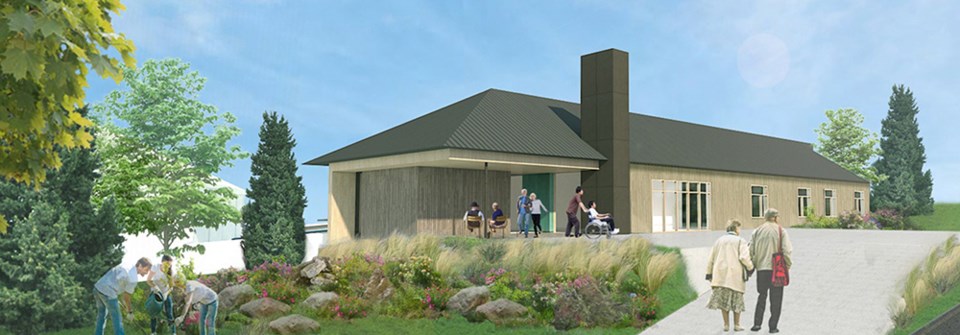A capital campaign for a four-bed hospice facility will begin soon, according to Cathy Fisher, president of Powell River Hospice Society. Fisher has been on the society board for four years and was elected president at the AGM in November. Created as a non-profit in 2014, the organization became a registered charity in 2017.
“We’re almost ready to start; it’s getting closer every day,” says Fisher.
Property on Powell River General Hospital campus near Willingdon Creek Residence for long-term care has been set aside by Powell River Regional Hospital District.
Estimated cost for the building is $4 million with 50 per cent raised or committed including $1.2 million from the regional health district, $400,000 from BC Centre for Palliative Care, $25,000 from Concentra, $20,000 from First Credit Union and $31,000 from personal donations.
“It will take the whole community to raise the funds,” explains Fisher, “but we’ve done it before for the CAT-Scan (Pass the Hat for the CAT) and I believe it will be done again. When people doubt it, I tell them, ‘you don’t know Powell River.’”
As an example, she notes that the annual Hike for Hospice, held virtually this year, raised $20,000, the most ever for the event.
“That was amazing. What we found is that in May, there are so many things happening in town,” adds Fisher. “This time people could walk or not walk, make a donation, and do their own route on their own time.”
Hike for Hospice Canada helps with the online donations through a secure portal and tax receipts are provided right away.
Another successful fundraiser is the Celebration of Life Tree at Town Centre mall. Last Christmas instead of having cards and pens available at a table, people were able to request a card electronically. Then hospice volunteers filled them out and placed them on the tree. Some people still choose to do their own cards but the majority choose the alternative provided. Donations were welcome but not required.
Other funding sources are personal and in-memory donations, grants, third-party fundraisers and legacy giving.
Focus on training
A big focus for fall is volunteer training. Currently there are 65 trained volunteers and about 35 are active. The society has been actively recruiting and has a waiting list now of people waiting for the 28 hours of training required. It focuses on effective communication, family dynamics, disease trajectories, bereavement and the physical, emotional and spiritual aspects of dying.
Nearly all hospice activities have changed or been curtailed during the pandemic. Volunteers were not allowed into long-term care facilities, the hospital or homes. They connect with clients by phone or FaceTime, or outside at a distance if the weather is good.
While volunteers do not counsel spiritually they can arrange for a priest or pastor to do that.
“That’s the job of churches, not ours,” says Fisher. “One other thing we couldn’t do initially during COVID was our bereavement support group. You can’t do that over Zoom. A few people met at a park but it was difficult.”
Currently the bereavement support group is meeting on Wednesdays at 10:30 am and 7 pm along the sea walk.
“People can talk and walk at their own pace. They can also stop to sit on a bench.”
Some support groups such as Alcoholics Anonymous have been allowed to meet but hospice volunteers work with people who are looking after someone who has a life-limiting illness or the people who are caring for them.
“They are extremely vulnerable and it has not been safe for us to be with them,” explains Fisher, who is looking forward to a return to a more normal situation for the society.
Referrals to the hospice society can be made by the client themselves, caregivers, health providers or Home Care nurses by calling 604.223.7309.
Fisher encourages people to become members of the society for an annual fee of $10. They can do that at prhospice.org.



